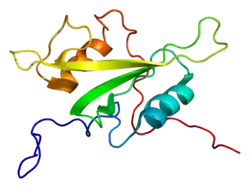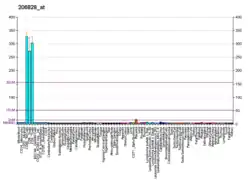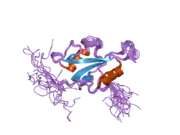TXK (gene)
Tyrosine-protein kinase TXK is an enzyme that in humans is encoded by the TXK gene.[5][6][7]
References
- GRCh38: Ensembl release 89: ENSG00000074966 - Ensembl, May 2017
- GRCm38: Ensembl release 89: ENSMUSG00000054892 - Ensembl, May 2017
- "Human PubMed Reference:". National Center for Biotechnology Information, U.S. National Library of Medicine.
- "Mouse PubMed Reference:". National Center for Biotechnology Information, U.S. National Library of Medicine.
- Haire RN, Ohta Y, Lewis JE, Fu SM, Kroisel P, Litman GW (Nov 1994). "TXK, a novel human tyrosine kinase expressed in T cells shares sequence identity with Tec family kinases and maps to 4p12". Hum Mol Genet. 3 (6): 897–901. doi:10.1093/hmg/3.6.897. PMID 7951233.
- Spritz RA, Strunk KM, Lee ST, Lu-Kuo JM, Ward DC, Le Paslier D, Altherr MR, Dorman TE, Moir DT (Jan 1995). "A YAC contig spanning a cluster of human type III receptor protein tyrosine kinase genes (PDGFRA-KIT-KDR) in chromosome segment 4q12". Genomics. 22 (2): 431–6. doi:10.1006/geno.1994.1405. PMID 7528718.
- "Entrez Gene: TXK TXK tyrosine kinase".
Further reading
- Suzuki N, Nara K, Suzuki T (2006). "Skewed Th1 responses caused by excessive expression of Txk, a member of the Tec family of tyrosine kinases, in patients with Behcet's disease". Clinical Medicine & Research. 4 (2): 147–51. doi:10.3121/cmr.4.2.147. PMC 1483892. PMID 16809408.
- Ohta Y, Haire RN, Amemiya CT, et al. (1996). "Human Txk: genomic organization, structure and contiguous physical linkage with the Tec gene". Oncogene. 12 (4): 937–42. PMID 8632917.
- Wardenburg JB, Fu C, Jackman JK, et al. (1996). "Phosphorylation of SLP-76 by the ZAP-70 protein-tyrosine kinase is required for T-cell receptor function". J. Biol. Chem. 271 (33): 19641–4. doi:10.1074/jbc.271.33.19641. PMID 8702662.
- Raab M, da Silva AJ, Findell PR, Rudd CE (1997). "Regulation of Vav-SLP-76 binding by ZAP-70 and its relevance to TCR zeta/CD3 induction of interleukin-2". Immunity. 6 (2): 155–64. doi:10.1016/S1074-7613(00)80422-7. PMID 9047237.
- Schneider H, Schwartzberg PL, Rudd CE (1998). "Resting lymphocyte kinase (Rlk/Txk) phosphorylates the YVKM motif and regulates PI 3-kinase binding to T-cell antigen CTLA-4". Biochem. Biophys. Res. Commun. 252 (1): 14–9. doi:10.1006/bbrc.1998.9559. PMID 9813138.
- Rajagopal K, Sommers CL, Decker DC, et al. (2000). "RIBP, a novel Rlk/Txk- and itk-binding adaptor protein that regulates T cell activation". J. Exp. Med. 190 (11): 1657–68. doi:10.1084/jem.190.11.1657. PMC 2195727. PMID 10587356.
- Schneider H, Guerette B, Guntermann C, Rudd CE (2000). "Resting lymphocyte kinase (Rlk/Txk) targets lymphoid adaptor SLP-76 in the cooperative activation of interleukin-2 transcription in T-cells". J. Biol. Chem. 275 (6): 3835–40. doi:10.1074/jbc.275.6.3835. PMID 10660534.
- Chamorro M, Czar MJ, Debnath J, et al. (2004). "Requirements for activation and RAFT localization of the T-lymphocyte kinase Rlk/Txk". BMC Immunol. 2: 3. doi:10.1186/1471-2172-2-3. PMC 31577. PMID 11353545.
- Takeba Y, Nagafuchi H, Takeno M, et al. (2002). "Txk, a member of nonreceptor tyrosine kinase of Tec family, acts as a Th1 cell-specific transcription factor and regulates IFN-gamma gene transcription". J. Immunol. 168 (5): 2365–70. doi:10.4049/jimmunol.168.5.2365. PMID 11859127.
- Kashiwakura J, Suzuki N, Takeno M, et al. (2002). "Evidence of autophosphorylation in Txk: Y91 is an autophosphorylation site". Biol. Pharm. Bull. 25 (6): 718–21. doi:10.1248/bpb.25.718. PMID 12081135.
- Strausberg RL, Feingold EA, Grouse LH, et al. (2003). "Generation and initial analysis of more than 15,000 full-length human and mouse cDNA sequences". Proc. Natl. Acad. Sci. U.S.A. 99 (26): 16899–903. doi:10.1073/pnas.242603899. PMC 139241. PMID 12477932.
- Rafalska I, Zhang Z, Benderska N, et al. (2005). "The intranuclear localization and function of YT521-B is regulated by tyrosine phosphorylation". Hum. Mol. Genet. 13 (15): 1535–49. doi:10.1093/hmg/ddh167. PMID 15175272.
- Kimura K, Wakamatsu A, Suzuki Y, et al. (2006). "Diversification of transcriptional modulation: large-scale identification and characterization of putative alternative promoters of human genes". Genome Res. 16 (1): 55–65. doi:10.1101/gr.4039406. PMC 1356129. PMID 16344560.
This article is issued from Wikipedia. The text is licensed under Creative Commons - Attribution - Sharealike. Additional terms may apply for the media files.






